Whether you’re living full-time in your van or enjoy road-tripping in your RV, you might find yourself at times camping on the stealthy side.
This form of camping involves sleeping in your camper or vehicle overnight while parked in an urban area where camping is not permitted. In most cases, it refers to overnight camping in a city.
It’s not for everyone, but if you don’t mind trading in the campground amenities for the convenience and freedom of staying almost anywhere, you should give this type of undercover camping a try!
In this guide, we’ll go over how to do it, give advice on avoiding issues, tell you where to find the best overnight parking spots, and provide useful tips for spending the night in your camper in an urban setting.
Table of Contents
“Stealthing”: All You Need to Know
Want to start undercover camping but not sure how to start? Here’s everything you need to know about camping in the city.
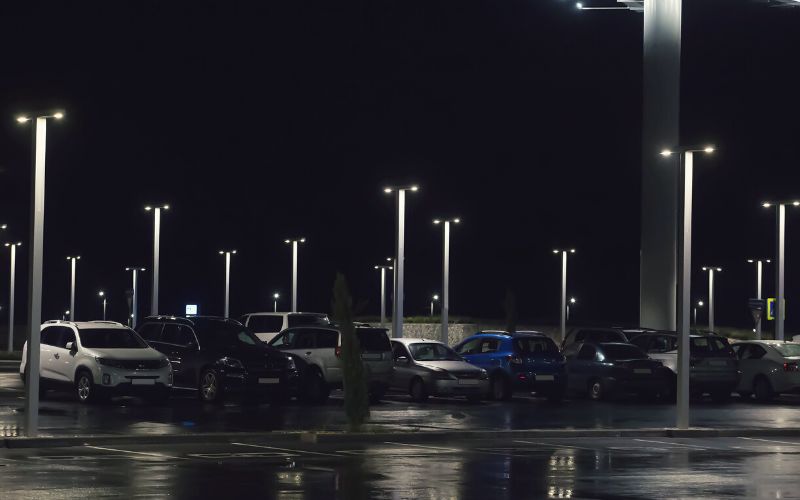
What Is Stealth Camping?
Sleeping overnight inside your vehicle in locations where it’s typically not allowed is known as stealth camping. This type of under-the-radar camping is sometimes necessary when staying in urban areas without campgrounds or in rural zones where boondocking is prohibited.
The reasons for having to covertly camp vary greatly. Some people without housing sleep in their cars out of necessity. Others choose to save on rent by living out of their vehicles while working full-time. There are also RVers who camp this way when visiting cities as a way of avoiding hefty RV park fees.
To stealth camp, you first need to search for a parking spot where you can stay overnight. This means deciphering parking signs to figure out if you can park there all night. Places like residential areas, city streets, community parks, hotel parking lots, and marina parking lots are all areas where people stealth camp.
Once you find your overnight spot, do your best to be quiet and blend in with the other parked vehicles without attracting unwanted attention. You don’t want people or neighbors to know you’re sleeping there because they may ask you to leave. Or worse yet, they might call the cops on you!
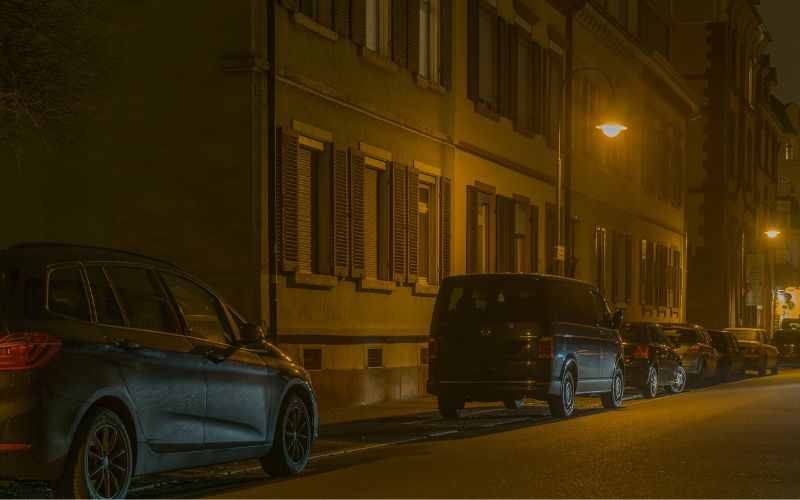
Is it Legal to Stealth Camp?
The legality of sleeping in your vehicle varies greatly by location, so you might want to do a quick search online to check the local laws before attempting to stay overnight in a new location. Even just the act of living in your vehicle is considered illegal in some parts of the US, most definitely making stealth camping illegal there too.
If you’re on a road trip and driving through a town in the middle of nowhere, they might not mind if you decide to stay a few nights in your RV. It’s much easier to find legal overnight parking in smaller towns, especially at big stores like Walmart.
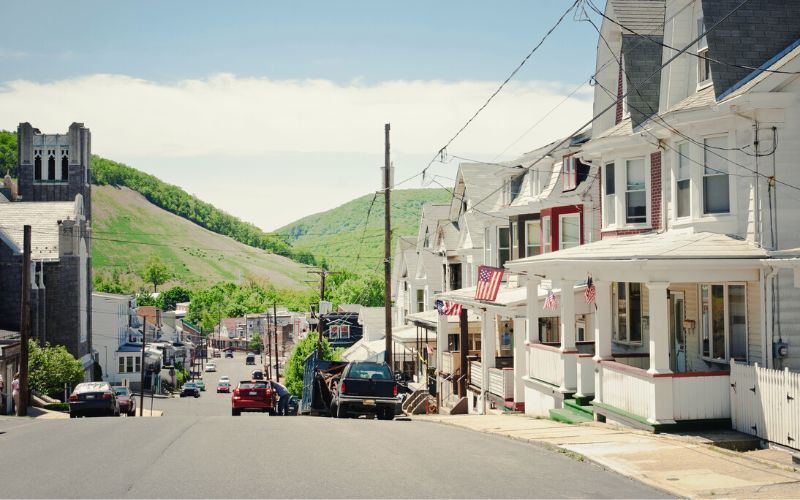
But you’ll find that the opposite is true in high-density metropolitan areas and tourism hot spots. For the most part, these highly coveted locations have put in place laws to prohibit people from sleeping in their vehicles in certain areas in an attempt to deal with people without houses.
In places like these, you need to watch out for the “dreaded knock.” This is the term used for when the police knock on your camper in the middle of the night. The best-case scenario is that they kindly ask you to move, but they may also hand you a ticket. Other times, you may simply wake up to a parking ticket or a resident’s nasty note on your windshield.
Is Stealthing Safe?
This type of camping is generally considered safe, but there are a few risks involved with sleeping overnight on city streets. Stay safe by choosing overnight spots in low-crime areas of the city.
Can you imagine how terrifying it must be to wake up to the sound of someone prying open your door?
Although it’s rare, there’s always the possibility of a thief trying to break into your camper while you’re in it. Keep a can of pepper spray handy and have your keys within reach, so that you’re ready to get up and go in case of an emergency.
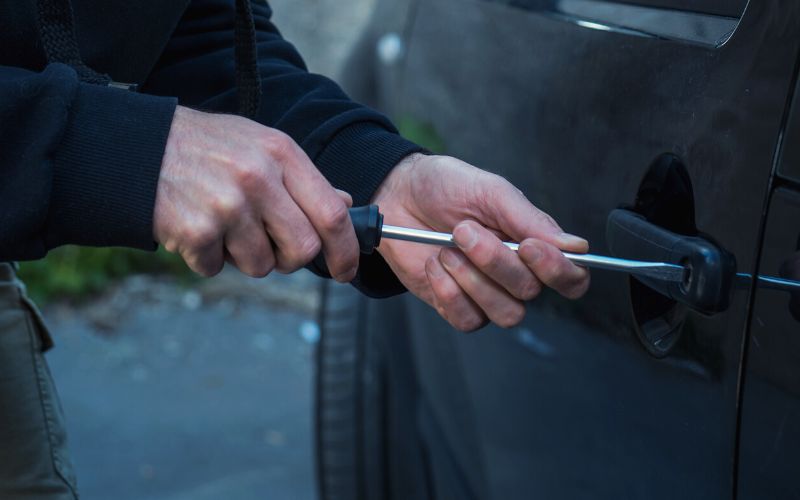
An extremely unlikely, yet the real risk is that of a car crashing into your vehicle while you’re sleeping in it. To minimize this risk, try to avoid staying in areas where cars are speeding by. Places like marina parking lots and residential streets are much less likely to be the scene of a high-speed accident.
Overall, the most common issue when sleeping in your camper is the very real possibility of upsetting the residents and getting kicked out of your street parking spot.
Is It Worth It?
At this point, you might be wondering if “stealthing” is even worth all the hassle of avoiding tickets and finding the perfect overnight spot.
Wouldn’t it be easier to just pay for a site at an RV park or stay at a campground? It is, of course, a matter of personal preference and budget, but stealth camping is usually worth it.
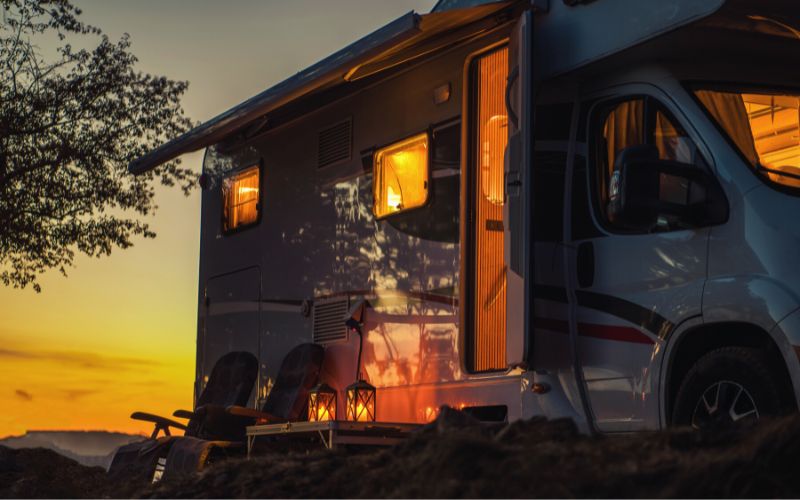
If you’re RVing on a budget, a week’s worth of free camping can save you thousands of dollars. The overnight rates for a site at most RV parks in cities with lots of tourist attractions can be insanely expensive. Depending on the resort’s amenities, some RV parks cost over 200 dollars per night, sometimes charging even more than nearby hotels.
Maybe you’re on a spontaneous California road trip and dream of parking up at one of the state’s beautiful beach campgrounds.
Well if you didn’t make reservations, you can forget about it. Sites at most beach campgrounds there are normally completely booked 6 months beforehand. This leaves those of us that like to wing it and travel reservation-free without a beach campsite.
With stealthing, you can still enjoy a day at the beach and watch the sunset over the horizon. Afterward, you can find someplace nearby to park overnight and wake up in time to return and catch the sunrise.
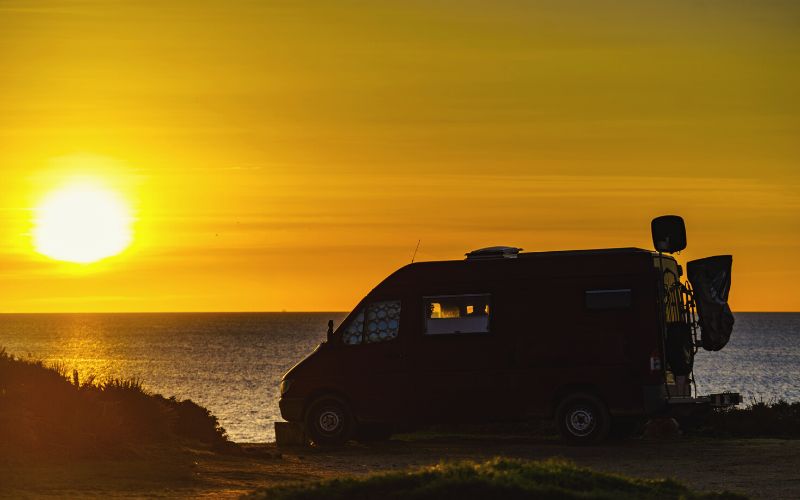
Is It the Same as Dispersed Camping?
Stealth camping is not the same as dispersed camping. They are quite the opposite.
Dispersed camping is the term commonly used by government agencies, including the national forests, state parks, BLM land, and the national parks, to describe camping on public lands outside of recreational facilities, like developed campgrounds.
Depending on the location, this type of camping may be limited to a certain zone, but it’s completely legal. You can set up your tent, use your stove, and greet the park ranger when they drive by.
Dispersed camping is regular camping, but typically without any services and in an isolated area. It’s a great way to get away from it all and immerse yourself in nature.
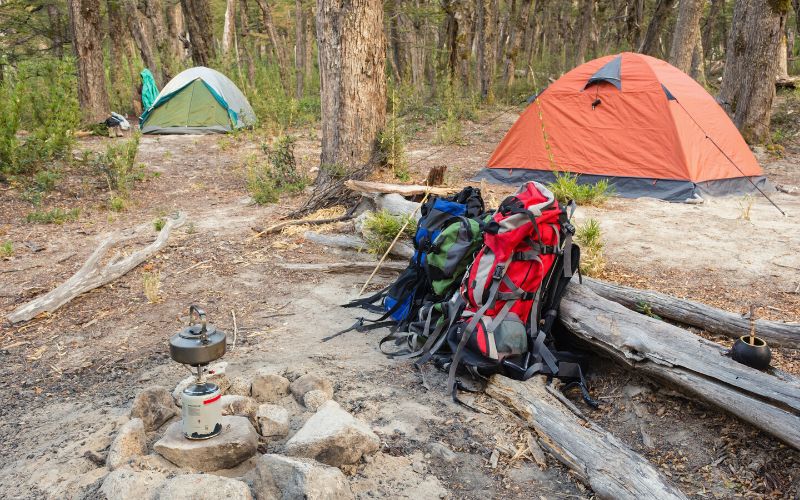
On the other end of the spectrum, stealth camping is covert camping in urban areas. It’s usually illegal and you definitely shouldn’t wave to the cops from your bed if they pass by.
Stealth camping involves being as clandestine as possible. There’s no setting up your stove on the sidewalk in front of someone’s house. Although some people still do, please don’t be that person.
Where Can I Find Info on Spots to Stealth Camp?
Using an app is a great way to find info on stealth camping spots. Most camping, RV, and van life apps have free overnight parking spots listed, along with photos, ratings, and helpful reviews.

It’s important to read the most recent reviews to see if it’s still a viable spot. Areas becoming overcrowded with campers is one of the downsides to staying at sites listed on apps. Signs with parking restrictions, such as no parking from 10 pm to 6 am, usually start to appear once the spot becomes too popular with stealth campers.
Some of the top RV, and van life apps to download and find good spots for stealth camping are iOverlander, Campendium, Sekr, FreeRoam, and Park4Night.
You can also try searching online for the city’s free parking lots. Many cities have a list of parking areas on their official websites.
Using Google Maps is another way to find a stealth camping spot. This technique works best for those trying to stay off the police’s radar by avoiding sites listed on apps.

Use Google’s satellite map to search for possible overnight parking and scout it out earlier in the day to see if it’s a good spot.
Depending on your location, you may not even have to find a stealth spot. Many businesses allow overnight RV parking in cities without vehicle habitation restrictions.
Call ahead and ask if they allow overnight parking to be completely safe. Also, try to return the favor by purchasing something from their store or eating at their restaurant.
The following places normally allow overnight RV parking:
- Big box stores, like Walmart and Sam’s Club
- Home improvement stores, like Home Depot and Lowe’s
- Outdoor recreation stores, like Cabelas and Camping World
- Cracker Barrel restaurants
- Casinos
- Highway rest stops
- Flying J and Pilot truck stops
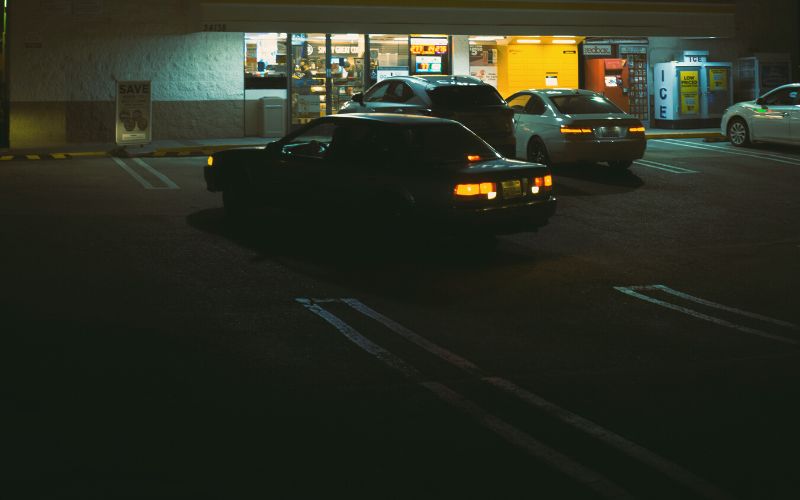
Tips for Stealthing in an RV
You might find it a little stressful at first, but stealth camping in an RV is easy once you get the hang of it. Here are our best tips for a successful night of stealthing in your vehicle.
1. Arrive Late and Leave Early
This might be the most important tip for a successful stealth camp! Always arrive at your selected spot after dark and leave soon after sunrise, especially when you are stealth camped on a residential street.
The goal here is to avoid being noticed by only staying there while most people are inside their homes or sleeping and being gone before they leave to work.

2. Be as Quiet as Possible
You need to learn to be as quiet as a mouse to successfully pull off stealth camping, especially in residential areas. Eat dinner and get ready for bed before you arrive.
You should be able to park, turn off the vehicle, close the curtains and quickly get in bed. Once in bed, you can do quiet activities until you fall asleep, like watching a movie with headphones on or reading a book.
3. Don’t Stay in One Spot
One of the keys to avoiding “the knock” is to avoid staying overnight in the same parking space for too long. A general rule for stealthing is not to stay in the same place for more than 2 nights.
Moving around helps prevent people from noticing you. Build up a list of several different locations that you can rotate through if you’re going to spend a good amount of time in just one city.
For example, stay at X spot Monday and Tuesday, move over to Y spot on Wednesday and Thursday, and then drive to another spot to stay on Friday and Saturday. Repeat this process weekly.
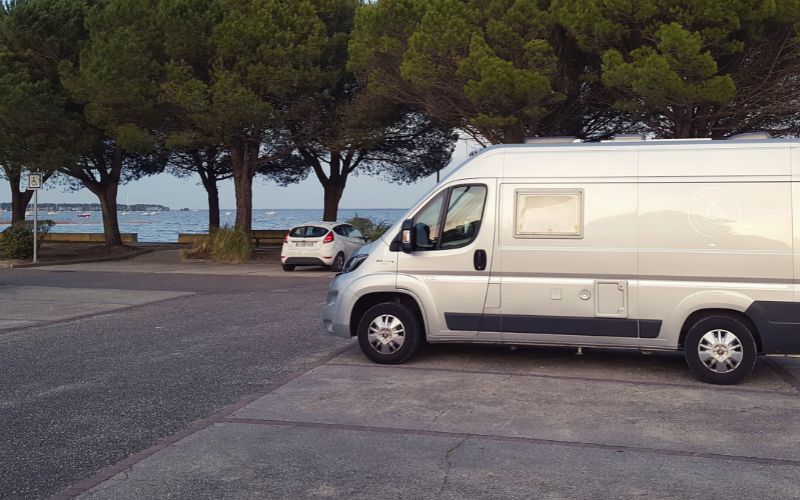
4. Try to Blend in
Hate to break it to you, but your ability to get away with stealthing depends a lot on the look of your vehicle. This is one of the reasons why it may be best to avoid sticking your collection of national park stickers and your Instagram on the outside of your camper.
Regular passenger cars and minivans can park overnight almost anywhere without getting a second glance from residents. A more stealth camper van like a windowless, self-converted cargo van can also get away with a lot.
Even obvious decked-out vans with tons of overlanding accessories may be able to park in residential areas in places where residents park their camper vans on the street.
Meanwhile, large Class A motorhomes and trucks with pop-up campers will have to work harder to find spots to stay.
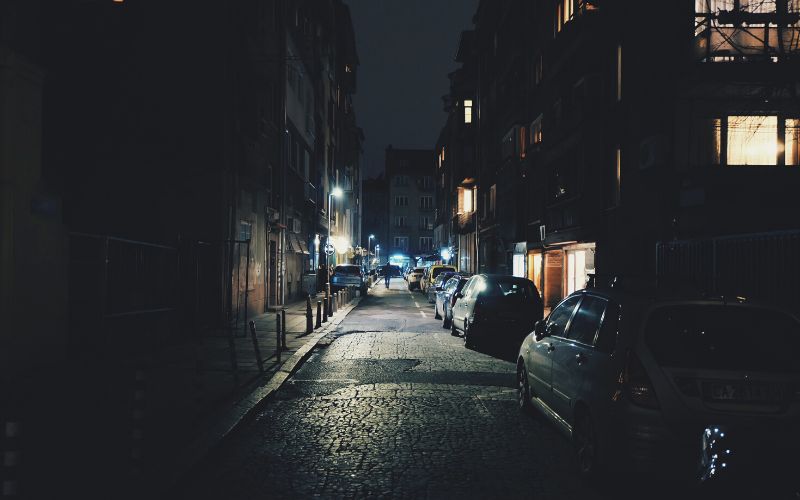
5. Keep It Clean
Most people won’t care if there’s a clean, well-kept, and tidy vehicle parked outside their home or business. But filthy campers stuffed with belongings are bound to draw dirty looks and unwanted attention.
Keep your vehicle sparkling clean. Most importantly, never, ever leave trash behind. This is crucial! Littering of any kind, including dumping out your cooking water next to your RV is a surefire way to anger the locals and motivate them to give stealth campers the boot.
6. Cover Up Your Windows
You don’t want people to see you sleeping in your vehicle. Take the necessary precautions to avoid people from peeking in and stop any interior light from getting out.
Use blackout curtains, Reflectix, or window tint to cover up all the windows as much as possible overnight. Even just the light from your cell phone can be a dead giveaway.
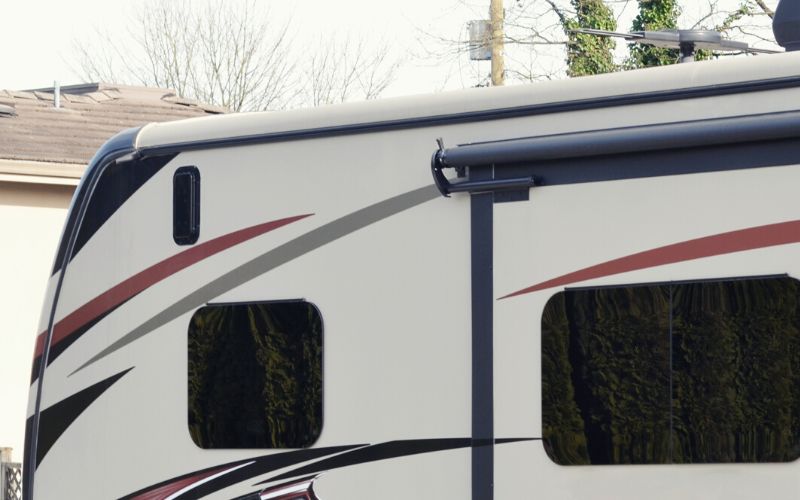
Tips for Stealthing in a Tent
Whether it’s in a city or a forest, many bikers and hikers often find themselves needing to stealth camp in a tent. Many of the tips for RVs, like being quiet, not littering, and avoiding lights apply to covert tent camping too. Here are a few extra tips for pitching a tent on the down low.
1. Pick the Right Tent Color
Choose a brown, green, or neutral-colored tent to try to blend in with your surroundings. You can spot a bright orange tent a mile away, but a well-camouflaged tent will disappear into the background.
2. Camp on High Ground
Look for a pitching spot that’s above any roads or trails. This helps prevent people from looking down and seeing you. It also prevents your tent from flooding if it rains overnight.
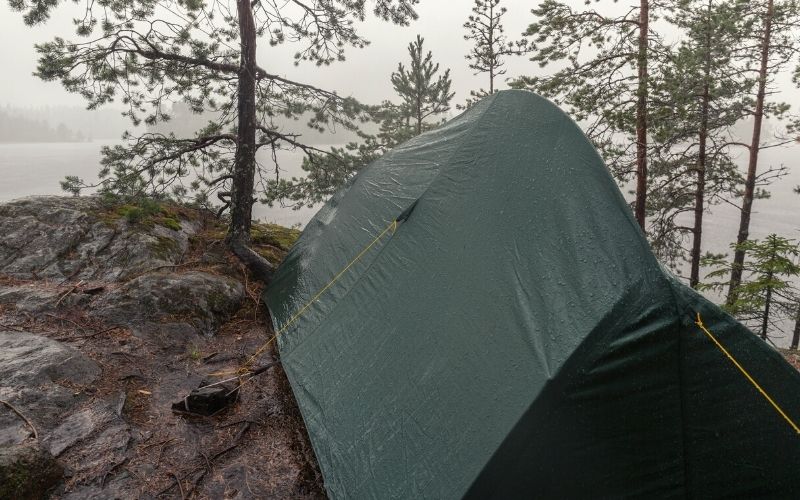
3. Set up Before Dark
When stealthing in a tent, you need to have your tent set up and ready to sleep in before dark to avoid having to use flashlights at night and immediately give away your location.
4. Cover Your Tracks
Try to cover up your footprints and bicycle tracks with tree branches or kick dirt over them. Otherwise, you’re leading people straight to you!
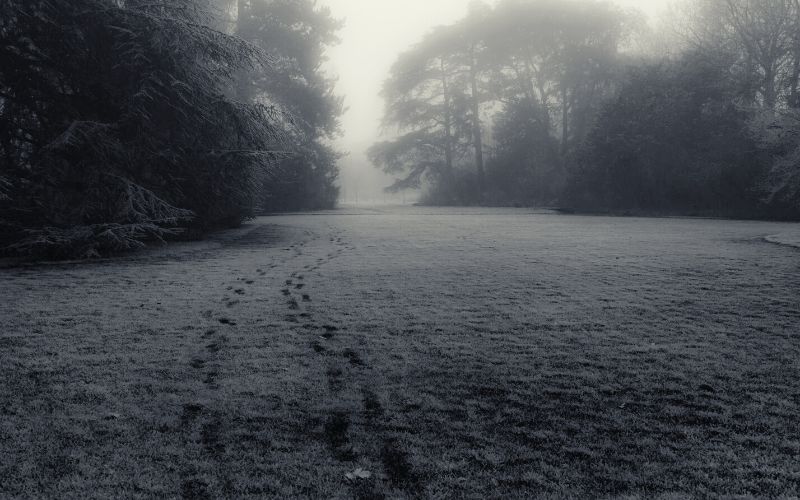
Happy Camping!
With the right preparation and knowledge, a successful night of stealthing allows you to camp in an incredible area with quick access to popular attractions.
Remember to check the local laws on sleeping in your vehicle, stay in a safe spot, and do your best to remain unnoticed.
What are your best tips for stealth camping? Let us know in the comments below. If you found this article helpful, please share it!

